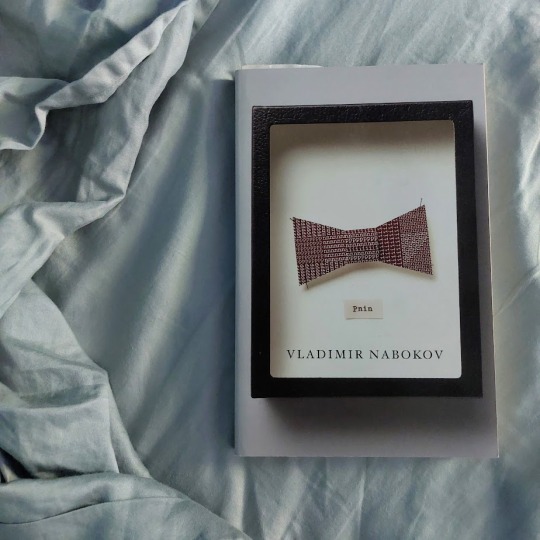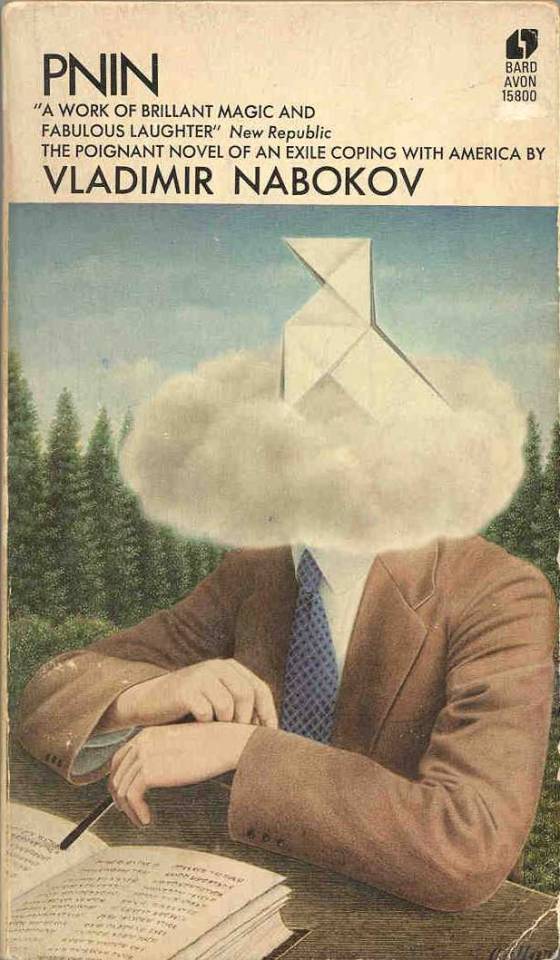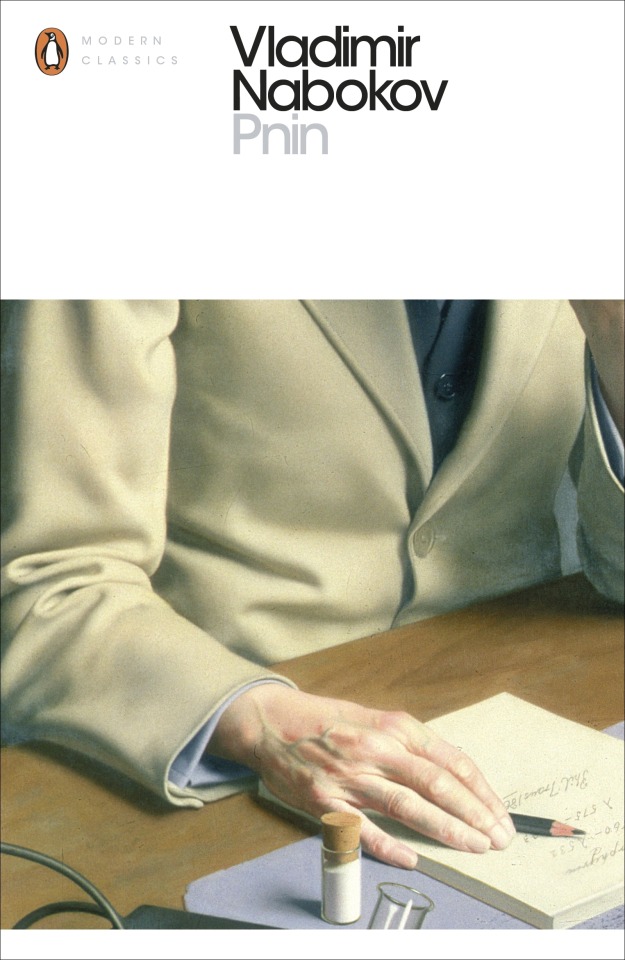#pnin
Explore tagged Tumblr posts
Text

Hopelessly entranced by Pnin, actually
5 notes
·
View notes
Text
Some people— and I am one of them— hate happy ends. We feel cheated. Harm is the norm.
Vladimir Nabokov, Pnin
15 notes
·
View notes
Text

Books of 2023: PNIN by Vladimir Nabokov.
#books#books of 2023#pnin#vladimir nabokov#book photography#anyway the bookmark for this is also the receipt for this#which is dated 2018#which. isn't AS bad as some of the books that have been languishing on my backlist#but also it's not great lol#i'm switching into nano prep mode by degrees over here#we are going for a Different Vibe than driscoll!!#nano2023
22 notes
·
View notes
Text

Read of Pnin by Vladimir Nabokov (1953) (191pgs)
4 notes
·
View notes
Text

Reading list right now-
Pnin by Vladimir Nabokov
The Machiavellians by James Burnham
The Ordeal of Civility by John Murray Cuddihy
Love in the Time of Cholera by Gabriel García Màrquez
1 note
·
View note
Text
On the eve of the day on which Victor had planned to arrive, Pnin entered a sport shop in Waindell's Main Street and asked for a football. The request was unseasonable but he was offered one.
'No, no', said Pnin, 'I do not wish an egg or, for example, a torpedo. I want a simple football ball. Round!'
- Pnin, Vladimir Nabokov
3 notes
·
View notes
Text
“To consider the possible sources of Pnin in Nabokov's experiences at Cornell is to be reminded that the book was a very early example of the "campus novel", a subgenre which is very familiar to us now, but was only just beginning to manifest itself in the early 50s. Mary McCarthy's The Groves of Academe (1952) has some claim to be the first in the field, and Nabokov would certainly have been familiar with it, since he knew both McCarthy and her husband, Edmund Wilson, who was one of his closest literary friends at this time (they fell out later). Randall Jarrell's Pictures from an Institution (1954) which was, for those in the know, a riposte to McCarthy's book, gave a further impetus to the new genre, though Nabokov had already embarked upon the Pnin stories when it appeared.
What the three books have in common is a pastoral campus setting, a "small world" removed from the hustle and bustle of modern urban life, in which social and political behaviour can be amusingly observed in the interaction of characters whose high intellectual pretensions are often let down by their very human frailties. The campus novel was from its beginnings, and in the hands of later exponents like Alison Lurie and Mal colm Bradbury, an essentially comic subgenre, in which serious moral issues are treated in a "light and bright and sparkling" manner (to borrow the phrase applied to Pride and Prejudice by Jane Austen, who would certainly have a written a campus novel or two if she had lived in our era).”
2 notes
·
View notes
Text

A little more light-hearted than Lolita. Reading on my son’s recommendation.
2 notes
·
View notes
Text
Now a secret must be imparted: Professor Pnin was in the wrong train. "Pnin" by Vladimir Nabokov
0 notes
Text
One of the best-loved of Nabokov’s novels, Pnin features his funniest and most heart-rending character. Professor Timofey Pnin is a haplessly disoriented Russian émigré precariously employed on an American college campus in the 1950s. Pnin struggles to maintain his dignity through a series of comic and sad misunderstandings, all the while falling victim both to subtle academic conspiracies and to the manipulations of a deliberately unreliable narrator.Initially an almost grotesquely comic figure, Pnin gradually grows in stature by contrast with those who laugh at him. Whether taking the wrong train to deliver a lecture in a language he has not mastered or throwing a faculty party during which he learns he is losing his job, the gently preposterous hero of this enchanting novel evokes the reader’s deepest protective instinct.Serialized in The New Yorker and published in book form in 1957, Pnin brought Nabokov both his first National Book Award nomination and hitherto unprecedented popularity.


82 notes
·
View notes
Text

i love you vinted seller made me a bundle for £10 AAAA
2 notes
·
View notes
Text
Nabokov’s weird for me because everything about his writing is ‘my type of writing’ but even though I think he’s incredible I don’t have that type of fascination and passion for his stuff in general, that personal thing.
This is the one singular thing on which one of my best friends really looked at me like I was crazy and said ‘no Mark, I’m sorry, this time I think it has to be the politics. That’s it, I’m sorry, I think you’re just biased this time, it has to be, that makes no sense, it’s Nabokov’
4 notes
·
View notes
Text


let's read gays

#like Say No More.#finished pnin by nabokov today so on that high still. that was the best thing ive ever read. anywayz#text
2 notes
·
View notes
Text
Ngl I feel like if you want a selection of 'classics' like Limbus has I'd bump the earliest date back to the 60s so you can include Beat generation and Soviet authors like Burroughs and Nabokov without having to use their more obscure works (that being said, a sinner based on Interzone would be super fascinating). There's also the thing that we don't actually know which books that are being written and published now will eventually become classics. Also I'd argue if you're going for contemporary...the 80s aren't really that.
For France something Despentes feels like the obvious choice (not sure which one tho I haven't read much of her), but if you're trying to do something that parallels the existing sinners something post-colonial would be much more interesting. I don't really know any Algerian/former french colony works though (aside from The Meursault Investigation which would be very cheeky), just British ones but maybe Chinua Achebe/Anthills of the Savana?
I don't know who counts as a famous modern Japanese author except Murakami (who sucks) so I'm just going to give you a favourite of mine - Izumi Suzuki/Terminal Boredom. We need more female authors anyways. Do a Meursault like sinner sharing a mind with her emotional best friend who's in cryogenic stasis or something or a hyperviolent disillusioned enkaphillian addict who views the world like it's a boring TV show.
My pick for Gregor's cultural oddity is László Krasznahorkai - he's Hungarian not Czech but it's more interesting than German author no. 3 and hey it's Satantango guy who doesn't like a good story about the slow destruction of a failed authoritarian state written entirely without periods where Satan is a main character?
I don't know if you're counting Dante/Italy, but Umberto Eco has some great works to draw from. Foucault's Pendulum is a great story about conspiracy theories which would be fun to work with.
Also I'm sorry I'm gonna have to fight your UK/US choices. I'd argue Clockwork Orange or Fight Club have more meat to them thematically if you're looking for stories with similar themes with popular movies (tho the Kubrick sucks) and same for le Guinn or Atwood or PK Dick for a genre fiction pick. If you're considering them on a purely film basis though, might I suggest Brazil instead for something tonally similar to Hitchhiker's Guide? Or if you want the SciFi as well, bend the 80s onwards timeline and do Stanislav Lem's The Futurlogical Congress for Russia (yes he's Polish but we count Gregor as German because of ruling empires).
limbus company fans who read more books than me, what books would you choose to represent modern literature for a theoretical B-Team for the bus. like, 1980s and beyond
so far I only have Patrick Bateman representing the US and Arthur Dent representing the UK and no particular ideas surrounding them. literally just thinking up names.
maybe Touma Kamijou for Japan but someone probably has a better idea that isn't derived from a shounen LN
#limbus company#textpost#I'm not claiming Nabokov is a Soviet author btw#just you could do Pnin or something#also I swear I do know some modern Korean authors I just can't remember their names rn#I'm sorry it's just Dent is a very static passive character in a 'random bullshit happens' story#I have no idea how you could actually do a satisfying story in The City about that
19 notes
·
View notes
Text
Nabokov tier list
S: Ada
A: Lolita
B: The Luzhin Defense, Pale Fire
C: Bend Sinister, The Gift
D: The Real Life of Sebastian Knight, Invitation to a Beheading
E: Pnin, Transparent Things
F: The Eye, Look at the Harlequins!
#some unpopular opinions here i know#which i guess is why i'm posting it at all#it's impossible to tell in advance how much i'll like one of his books - either based on popular opinion or on when he wrote it#just all over the place#have yet to read some of the russian novels like despair etc.#will be fun to roll the dice once again
41 notes
·
View notes
Text

There is a trope that I love to read in fiction and especially in fanfiction: characters living the life they were meant to live, becoming the person they were meant to be, reaching the “ending” they were meant to reach all along, but via a completely new (and often more circuitous) route. This can be something a character decides in retrospect, that actually, this was what I wanted all along and it just took this journey along the twisted path to get to this realization.
This happy realization is accompanied by a profound grief over the more direct path not taken, the ghost of paths that were closed to the character by their own decisions or by circumstances outside their control. They see the ghost of the easier, more straightforward journey not taken, and they cannot ever dwell too long on the enormity of the time they had lost, the life they were robbed of, lest they are crushed by the unbearable weight of their loss.
This trope is best illustrated by this passage from Pnin by Vladimir Nabokov:
And the tiny house was so spacious! With grateful surprise, Pin thought that had there been no Russian Revolution, no exodus, no expatriation in France, no naturalization in America, everything - at the best, at the best, Timofey! - would have been much the same: a professorship in Kharkov or Kazan, a suburban house such as this, old books within, late blooms without. It was - to be more precise - a two-storey house of cherry-red brick, with white shutters and a shingle roof.
This is one of the happiest and saddest passages in the entire novel, in my opinion. Pnin has long last found a home of his own. And realizes this is exactly the home he could have had all along, if only the iron dice of history had rolled another way.
Pnin is a middle-aged professor of Russian Language at a college in upstate New York. It took him three decades of wandering and exile to achieve this life: a professorship at a university and a little suburban house near the campus. And now, after struggling for most of the novel to find a house of his own, he can finally put down roots. And in this moment of fulfillment, he imagines, briefly, how this journey could have been a straight line, a well trodden path from his upper middle class background in St. Petersburg , his bourgeois education, to a professorship and house in Kazan. But the impersonal hand of history shoved him onto a dark unknown road, fleeing persecution and war, from Russia to Turkey to Czechia to Germany to France and finally, ending up with that professorship and suburban house, but in upstate New York instead of Kazan.
This trope also makes an appearance in The Charioteer. It took seven years of exile, confused experimentations, failed relationships with other people, a world war, permanent injuries, and a series of coincidences and misunderstandings for Ralph and Laurie to end back right where it all began —in Ralph’s room, by the fireplace, the papers burning, the final moment before Ralph’s departure —so that Laurie could finally do what he should have done, what he had always meant to do: make Ralph stay. The platonic romance they should have had was stolen from them by persecution and bad luck, but they got their romance in the end, not through the well trodden path of The Phaedrus, but through the uncharted lonely road, making their own maps along the way.
15 notes
·
View notes